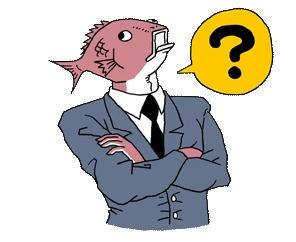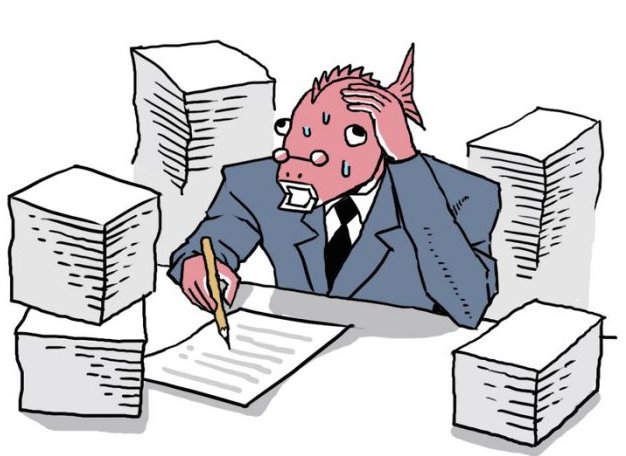
I can't always articulate what it is like to be a worker, writhing in muted panic in the net of late capitalism. But I have found a fine outlet in Business Fish, a surreal family of sticker sets on Facebook Messenger, which I use to illustrate many of my exchanges.
Business Fish has struck a nerve since his introduction last year: he has many vocal fans (3200+ on his Facebook page) and he's been profiled in the mainstream news. Inspired by the Shinto belief that divinity resides in animals, his creator—an artist at Tokyo-based studio Quan, Inc.—gave him a pink fish head capping a human body in a boxy blue suit that, in today's workplace fashion parlance, reads as "male business casual."
At first glance, Business Fish seems like a composite of Gordon Gekko and Jordan Belfort, ruthless hunters of success, profit and glamor. Closer examination of his sixteen, hyper-expressive graphics reveals a more complex narrative.
He wakes in shock, sweaty, the sun at his head. He gets caught in a subway turnstile. He struggles, briefcase in hand, coughing and shaking, knees buckling. After a setback, he slumps in shame against a wall. He bows, and weeps, and clenches his fists in rage. He grovels on the ground, possibly begging for the privilege of working another day.
Created with Japanese office culture in mind, but meant to represent office workers worldwide, Business Fish is a pressure-crushed employee, shot through with anxiety and anguish. If, as Sianne Ngai argues, strong emotions, particularly dysphoric ones, are "the psychic fuel on which capitalist society runs," Business Fish is a resource burning at both ends.

Though he is designed to have a generally "upbeat" tone, his happiness, his positive valences, are tempered. He tensely presents a cake to a coworker, possibly to increase his social capital. He plots, alone, at a bar. When he celebrates a win, he is just as alone.
These images are pretty dark, for Facebook stickers. They work on two levels: one, they can help users mediate personal emotion, expressing untidy frustrations with one's colleagues and managers without words. Two, they serve as commentary on an administered universe, in which the ability to manage, control and perform emotion is a commodifiable skill.
Business Fish offers a diagram for the management of emotional capital. As Paolo Virno suggests, affects like insecurity over competition and fear over one's position "haunt the workday like a mood that cannot be escaped." These moods are, again per Ngai, "reconfigured into professional ideals," to be adaptable, to push through on a project, to compete during overtime. These ideals grease along the economic system.

Channeling emotion into professional productivity makes us more marketable, as it does for Business Fish. Since the extreme pressure of self-management has consequences, his efforts can't always be perfectly contained. His triumphs become more and more unhinged: in one image, he laughs wildly, fists raised. In the next, his head is thrown back, his eyes are pupil-less and he is backlit by flames. The quarter's results are in: emotional carnage is just the cost of doing business.

